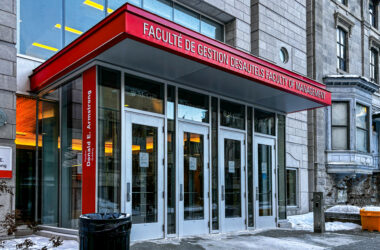What is CAMSR?
The Committee to Advise on Matters of Social Responsibility (CAMSR) is an ad hoc committee whose mandate is to advise the Board of Governors (BoG) on socially responsible investing. Final decisions on the University’s academic, business, and financial affairs rest with the BoG. For an investment to be considered socially-responsible, it must have both a positive social impact and produce positive returns on investment. For example, it would only be considered socially responsible for McGill to invest in a firm that produces solar energy if the firm’s stock were appreciating in value.
CAMSR is currently composed of 10 members: five from faculty and staff, one student representative, the chair of the BoG, the Principal, and one senior steward. CAMSR’s members are appointed by the BoG, usually on the recommendation of the Nominating, Governance and Ethics Committee.
Proposed changes to the terms of reference
CAMSR’s terms of reference, which define the committee’s scope, are currently under review. CAMSR has met twice to discuss the proposed changes and held a community consultation session at which students and faculty were encouraged to ask questions and provide feedback. The changes would prevent CAMSR from endorsing investment in social or political causes. This would also prevent CAMSR from advising the board to withdraw their investments for social or political purposes, such as divesting from the fossil fuel industry in support of sustainability.
Student and faculty groups including Divest McGill, Students in Solidarity for Palestinian Human Rights’ (SPHR) McGill chapter, and the McGill Association of University Teachers’ (MAUT) Council have vocally opposed the proposed changes as they severely limit CAMSR’s scope of influence over McGill’s investments. On Nov. 8, 2017 MAUT voted unanimously to divest from fossil fuels. Citing McGill’s decision to divest from South African companies to protest apartheid in 1985, and from tobacco companies in 2007, MAUT argues that McGill divestment has been successful in the past. Divest McGill has conducted numerous sit-ins and protests against the university’s continued investment in the fossil fuel industry. If the proposed changes are approved, CAMSR would no longer be mandated to address these concerns.
Divest McGill interrupted the BoG’s Dec. 12 meeting to protest the proposed changes, forcing the BoG to adjourn early. Following the interruption, Divest McGill outlined their concerns about the proposed changes in a letter to CAMSR.
Divest McGill has also criticized the BoG for failing to conduct sufficient research about the implications of preventing CAMSR from advising on socially responsible investment. The BoG consulted six experts prior to submitting the proposed changes, but these were experts primarily in green chemistry and sustainability, not in socially responsible investing. Additionally, the BoG failed to publicize the names and testimonies of the experts until Divest conducted a week-long sit-in outside Principal Suzanne Fortier’s office. Only five of the six testimonies were subsequently released. CAMSR and the BoG have previously been criticized for their lack of transparency, particularly concerning CAMSR’s terms of reference.
CAMSR last met on March 21 to discuss the proposed changes to the terms of reference in a closed meeting.








